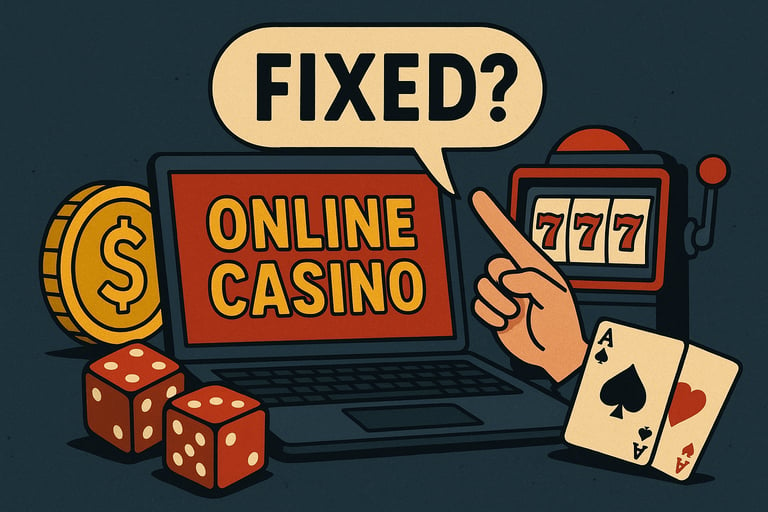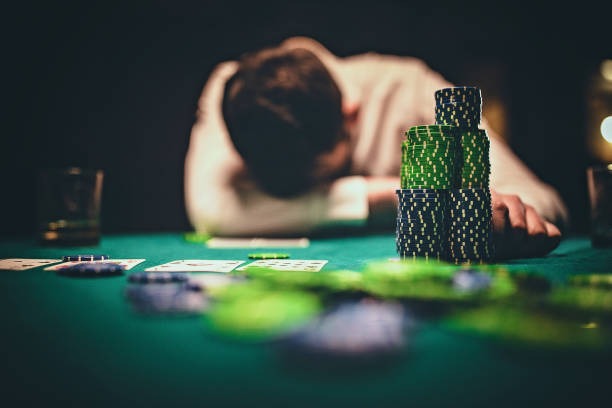Why Most People Lose in Casinos: The Psychology, Math, and Myths Behind Gambling Losses
Ever wondered why most people lose in casinos? Discover the hidden math, psychology, and traps that ensure the house always wins in the long run. Learn how gambling really works.
AWARENESSCASINO TIPSCASINO GAMES
9/4/20255 min read
Introduction: The Casino Dream vs. The Casino Reality
Casinos sparkle with glamour. The lights, the jackpots, the sound of coins falling, and the stories of winners walking away with millions make gambling look like the ultimate thrill.
But here’s the truth: most people lose in casinos. Not because they’re unlucky, not because they don’t try hard enough, but because the system is designed that way.
Sure, you’ll see jackpot winners and hear about people beating the house for one lucky night. But in the long run, casinos always profit while most players leave with lighter wallets.
In this blog, we’ll break down why most people lose in casinos—from the house edge and psychology tricks to the mistakes players make and the myths they believe.
1. The House Edge: The Silent Profit Machine
Every casino game has one thing in common: the house edge.
This is the mathematical advantage built into every game, no matter how “fair” it looks.
Roulette: Red/Black looks 50/50, but the green zero tilts odds in favor of the house.
Blackjack: Even with perfect strategy, the house edge is usually 0.5% to 2%.
Slots: Programs ensure the casino keeps 5% to 15% of all wagers over time.
The house edge doesn’t stop you from winning short-term. But over thousands of bets, it guarantees the casino will profit and players will lose.
2. The Law of Large Numbers: Why Luck Fades
Luck exists in the short term. Someone might win five roulette spins in a row or hit a jackpot. But casinos don’t care about a few lucky streaks—they rely on the law of large numbers.
This principle says that over enough bets, actual results will always move closer to the expected probability.
One player may leave a winner.
Ten players may win jackpots.
But millions of bets later, the math catches up, and the casino’s edge always shows.
This is why casinos encourage long play sessions. The more you play, the more certain it becomes that you’ll lose.
3. The Psychology of Casinos: Designed for You to Lose
Casinos aren’t just math—they’re psychology laboratories designed to keep players hooked.
No Clocks or Windows: You lose track of time, staying longer.
Bright Lights and Sounds: Every win, big or small, is celebrated to keep you excited.
Near Misses on Slots: Almost hitting a jackpot makes you keep spinning.
Free Drinks and Comps: Perks make you feel like you’re winning, even while losing money.
Casinos know how to manipulate human emotions: the thrill of risk, the pain of loss, the hope of recovery. It’s less about cards and dice, and more about psychology keeping you in your seat.
4. The Gambler’s Fallacy: Believing a Win is “Due”
One of the biggest reasons people lose is faulty thinking.
The Gambler’s Fallacy is the belief that past results affect future ones. For example:
“Black has come up 5 times in roulette, so red must be next.”
“I’ve lost 10 hands of blackjack, so I’m due for a win.”
In reality, every spin, card, or roll is independent. Believing otherwise causes players to keep betting bigger until losses spiral out of control.
5. Chasing Losses: The Fastest Way to Go Broke
Most casino players fall into the trap of chasing losses.
They lose $100, so they bet $200 to recover. Then they lose again, and bet $400. Eventually, they run out of money or hit table limits.
This is why betting systems like Martingale (doubling after each loss) fail miserably. Chasing losses may feel logical, but it accelerates the path to going broke.
6. The Illusion of Control: Why Players Overestimate Skill
Games like blackjack, poker, or sports betting give players the illusion of control.
In blackjack, players believe strategy can overcome the house edge.
In poker, while skill matters, casinos still take a cut (the rake) from every pot.
In sports betting, oddsmakers carefully set lines to ensure profits no matter the outcome.
Casinos let you feel like you’re in control—but the truth is, the math is always in control.
7. Addiction and Dopamine: The Brain Chemistry of Losing
Gambling activates the brain’s dopamine system, the same area linked to drugs and other addictions.
Small wins release dopamine, making you feel euphoric.
Near misses trigger almost the same brain response as a win.
Losses push you to play more, chasing that next dopamine hit.
Casinos thrive because they exploit the way human brains are wired. People keep playing, not because they’re rational, but because their brains crave the thrill.
8. The Myth of Beating the House
Every gambler has heard of systems to “beat the house”:
Martingale Strategy
Card Counting
Lucky Rituals
But here’s the truth:
Betting systems fail due to bankroll limits and table caps.
Card counting can work but is difficult, stressful, and banned if discovered.
Superstitions (lucky numbers, charms) have no effect on probability.
The myth of “beating the casino” is exactly what keeps people playing—and losing.
9. The Role of Time: Why the Longer You Stay, the More You Lose
The more time you spend in a casino, the more money you’re likely to lose. Why?
The house edge accumulates.
Short-term wins vanish over long sessions.
Exhaustion and emotions lead to bad decisions.
Casinos encourage long stays with free perks, comfortable seating, and endless entertainment. Time isn’t on the player’s side—it’s on the casino’s.
10. Player Mistakes That Lead to Losses
Most people lose in casinos not just because of the house edge, but also because of their own mistakes:
Not Knowing the Rules – Playing games without understanding them.
Bad Bankroll Management – Betting too much too quickly.
Chasing Jackpots – Going for high-risk bets with low chances.
Alcohol Influence – Free drinks cloud judgment.
Not Quitting While Ahead – Winning, then staying too long until losses catch up.
11. Casinos Reward Winners Too—But Why?
You may wonder: if casinos always win, why do they celebrate jackpots and show winners?
Because winners are the best marketing tool. One person walking out with a jackpot attracts thousands of others chasing the same dream.
The reality? For every jackpot winner, there are thousands of quiet losers funding that win.
12. Can You Ever Win in a Casino?
Yes, people can and do win. The key is short-term luck and discipline.
If you win and leave immediately, you beat the casino for that night.
If you play long enough, the house edge will reclaim your winnings.
The problem is that most players don’t stop when ahead. They keep playing until the math catches up.
13. The Business of Casinos: Built on Losses
Casinos aren’t gambling—they’re businesses. And like all businesses, their model ensures profit.
Games are mathematically tilted.
Hospitality and entertainment bring in additional money.
Even “player-friendly” games like poker still earn the house money via fees.
Casinos don’t gamble. They let you gamble, and they take a guaranteed profit.
Conclusion: Why Most People Lose in Casinos
So, why do most people lose in casinos?
Because the house edge ensures it.
Because time turns luck into losses.
Because psychology and addiction keep players hooked.
Because human mistakes amplify losses.
The truth is, casinos don’t rely on players making bad bets—they rely on players being human.
In the end, the casino’s design, psychology, and mathematics all serve one purpose: to make sure the house always wins in the long run.
That doesn’t mean you can’t enjoy casinos. If you treat gambling as entertainment, set limits, and know when to walk away, you can still have fun without falling into the trap.
But if you believe you can beat the system, remember this: casinos weren’t built on winners—they were built on the losses of millions chasing the dream of winning big.




© 2026 All rights reserved.
Follow us
Quick Links


